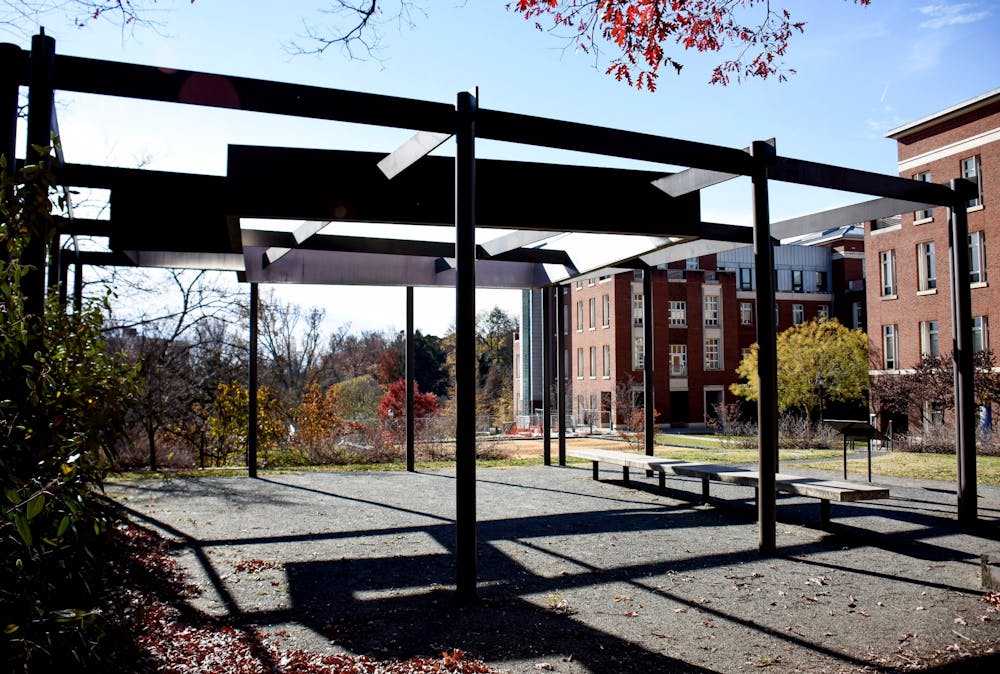The University’s new race, place and equity academic program is finishing up its first semester after successfully implementing 11 classes and funding 10 post-doctoral students. The program aims to provide a better structure for students to learn about race and equity as well as support faculty in teaching about racial equity and democracy.
Currently, eight COLA classes — one-credit, graded seminars for first-year students in the College of Arts and Sciences offered in the fall semester — aim to foster discussion about the lasting legacies of race and racism at the University by emphasizing cultural landscapes and natural places. The other three classes are offered by the School of Architecture and similar to COLAs, situate racial history in place and location.
Students in the classes learn from and work with members of the community to further the students' understanding of the University’s and Charlottesville’s racial history and serve the greater Charlottesville community.
The program shares similar goals to those recommended by the University’s racial equity task force, which was formed in summer 2020 following the murder of George Floyd and national protests over police brutality. The task force recommendations were endorsed by the Board of Visitors in September 2020 and included developing a series of educational programs around racial equity and anti-racism.
Funding for the program comes from a $5 million grant from the Andrew W. Mellon Foundation which the University received in January. School of Architecture Prof. Louis Nelson, vice provost for academic outreach and one of the program’s principal administrators, was instrumental in helping the University receive the grant, along with Ian Baucom, dean of the College; Claudrena Harold, chair of the history department; Nicole Jenkins, dean of the McIntire School of Commerce; Ian Solomon, dean of the Frank Batten School for Leadership and Public Policy; and Kevin McDonald, vice president for diversity, equity, inclusion and community partnerships.
“[The grant] was an opportunity for the University to take some proactive steps towards thinking about the ways that our curriculum, especially at the undergraduate level, as well as our investment in emerging faculty of color would have a positive impact on the future of higher education in Virginia and across the country,” Nelson said.
The three-year grant will continue to fund the creation of the classes across schools as well as 30 postdoctoral fellows, 10 per year, who will receive financial support and possible openings for tenure-track faculty jobs.
“We're very interested in using this series of courses and these investments in postdoctoral fellows as a way of building more sustainable and responsible relationships with important community partners who have been doing this work in these spaces for a long time,” Nelson said.
One community group that the classes work with is Trailblazers, a program organized through the Jefferson School African American Heritage Center that prepares young Black students in Charlottesville to give tours of the temporary and permanent exhibits at the center. Several classes have received tours as a way to further the students' learning and provide practice for the future tour guides.
Other community groups include the Monacan Indian Nation and Descendants of Enslaved Communities at U.Va.. Students have participated in site visits to the Monacan Indian Nation headquarters in Amherst County and conversations with members of the descendants organization.
Nelson also commented on the unique opportunity offered by the program that will enable community organizations and the University alike to benefit.
“The grant allows us to build a collaborative partnership that allows [community organizations] to have some of their needs met, so that this project furthers their mission, but also allows us to think about ways that we can bring that learning and that expertise into the classroom,” Nelson said.
“Walking Charlottesville: Exploring Race and Place through Writing,” a COLA class taught by English Prof. Kate Stephenson, provides students with weekly walking tours of different locations, including the Memorial to Enslaved Laborers and the Kitty Foster Memorial.The memorial is a metal structure which casts a shadow representative of what her home looked like — Foster owned a parcel of land that housed a free black community during the early years of the University.
“I hope [the students] really take in a sense of how local history, and even national history shapes our current experience, and the ways in which U.Va. really needs to reckon with its own history,” Stephenson said.
First-year College student Kameryn Daniels, who is currently taking Stephenson’s COLA class, said she feels she has gained valuable experience in having difficult conversations. Daniels said that as the only Black student in the class, she has had to become more comfortable conversing with her peers.
“Being able to look around and still get my thoughts out comfortably and know that people will listen and respond respectfully — I think it's just something that's opened me up to be able to be comfortable talking about things with anybody in the room, and just knowing that I will be heard,” Daniels said.
Students write reflections on the content from each week, which often include readings, conversations and site visits. The reflections — which can be anything that the students feel expresses their thoughts and reactions — have ranged from written paragraphs to poems to playlists.
“I think [the reflection] gives us that opportunity to express ourselves and express how we process that experience to us specifically,” Daniels said.
The goal is for first-year students to not only learn about the history that surrounds them but also to take the experiences from this academic program with them through their time at the University and beyond.
“I hope they leave the class just listening for the stories and the history around them a little more closely, and also see writing as a way to process their own experiences, and maybe even as a form of activism,” Stephenson said.





